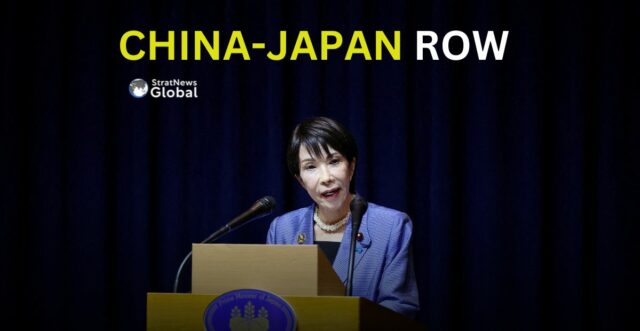China has escalated its growing dispute with Japan to the United Nations, accusing Tokyo of threatening military intervention over Taiwan and pledging, in its toughest language since the row began two weeks ago, that it will defend itself.
Japanese Prime Minister Sanae Takaichi committed “a grave violation of international law” and diplomatic norms when she said a Chinese attack on Taiwan could trigger a military response from Tokyo, China’s U.N. Ambassador Fu Cong wrote in a letter on Friday to U.N. Secretary-General Antonio Guterres.
“If Japan dares to attempt an armed intervention in the cross-Strait situation, it would be an act of aggression,” Fu wrote, according to a statement from China’s U.N. mission. “China will resolutely exercise its right of self-defence under the U.N. Charter and international law and firmly defend its sovereignty and territorial integrity.”
Biggest Bilateral Crisis In Years
Takaichi, a conservative nationalist who took office last month, ditched the ambiguity that Japan and the U.S. have long used regarding Taiwan when she told a questioner in parliament on November 7 that a hypothetical Chinese attack on Taiwan – which lies just over 100 km (60 miles) from Japanese territory – could be deemed “a situation threatening Japan’s survival”.
That is a legal designation that allows a Japanese prime minister to deploy the nation’s military.
Takaichi’s remarks sparked the tit-for-tat dispute with China that has spilled beyond diplomacy in recent days, with China saying it has “severely damaged” trade cooperation, while concerts of Japanese musicians in China have been abruptly cancelled.
Fu demanded that Japan “stop making provocations and crossing the line, and retract its erroneous remarks”, which he said were “openly challenging China’s core interests”.
Beijing Invokes Tokyo
Ahead of this year’s 80th anniversary of Japan’s World War Two defeat, Beijing has increasingly invoked Tokyo’s wartime atrocities and China’s postwar role in setting up the U.N. as it criticises its Asian neighbour and seeks to reshape the international governance system.
China, a permanent U.N. Security Council member, has repeatedly cited the postwar Potsdam and Cairo declarations, which envisioned Taiwan and other territories once occupied by Japan being “restored” to Chinese rule.
Beijing bases its sovereignty claims on these documents, though many governments regard them as nonbinding statements of intent. The declarations were signed by the Republic of China, which retreated to Taiwan in 1949 and held China’s U.N. seat until it was transferred to the People’s Republic of China in 1971.
(With inputs from Reuters)





